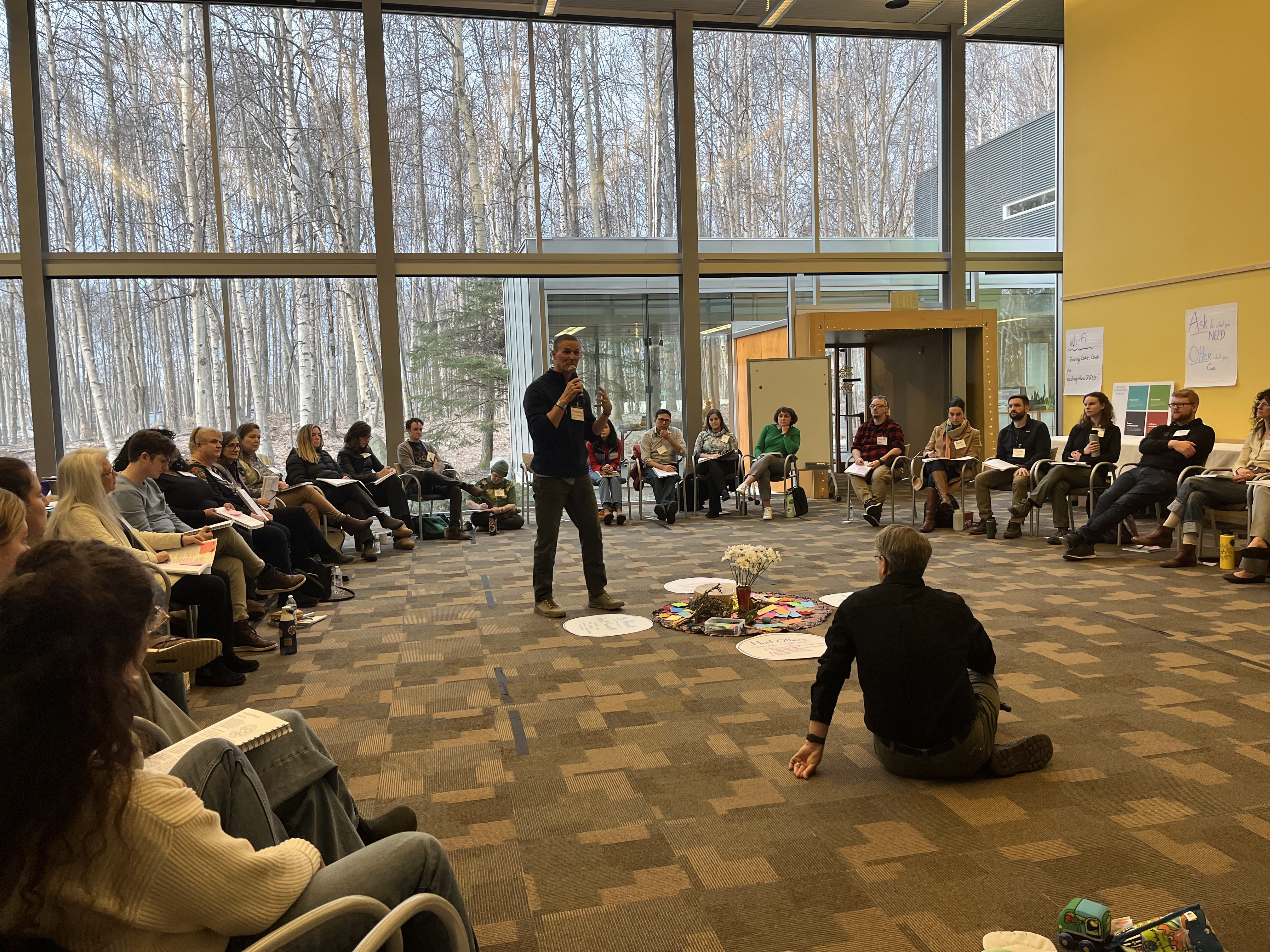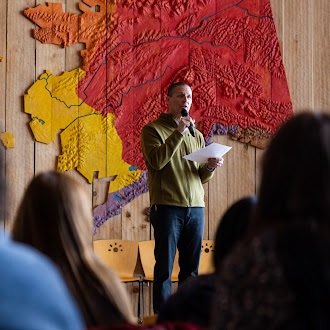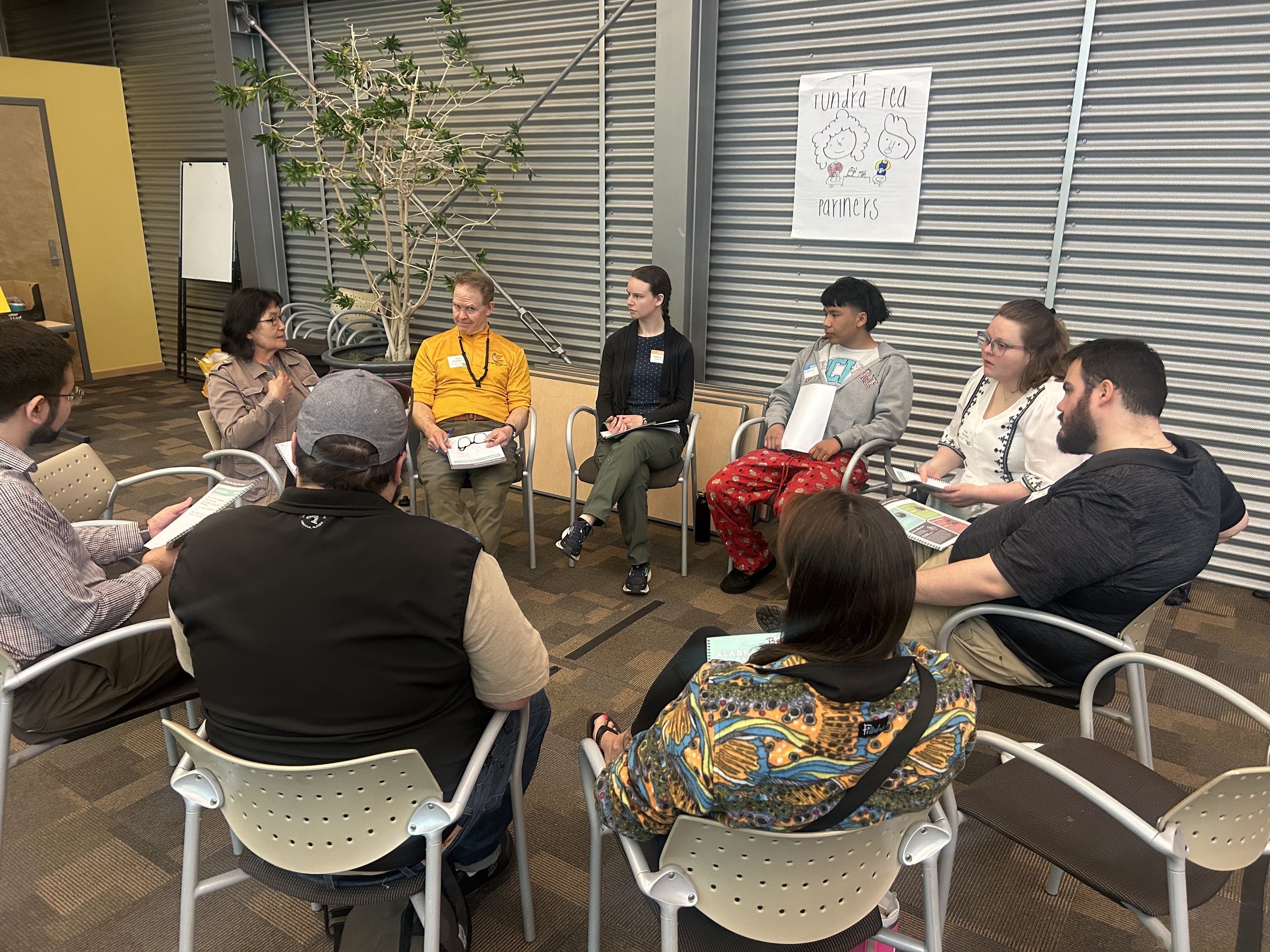
Opening the Art of Hosting Meaningful Conversations workshop in January 2025
Kameron Perez-Verdia • July 30, 2025
The Alaska Humanities Forum was founded in 1972 as Alaska’s state humanities council. A few years later, the organization transitioned into a 501(c)(3), and at that time was led by an extraordinary individual named Gary Holthaus. Gary was many things—a poet, author, pastor, philosopher, and community leader—but more than anything, he was someone who deeply believed in the power of people coming together. He saw the Forum’s core purpose not simply as a grant-making institution but as a convener: a place for people to gather, reflect, and engage with one another on the most pressing issues of the day.
That belief is baked into our very name. The Alaska Humanities Forum is the only state humanities council in the country with the word Forum in its name—a conscious choice meant to signal that our identity is rooted in dialogue. In its original form, a forum was a central gathering space—an open public square where issues were discussed and debated, where stories were told and decisions shaped. It’s a powerful image, and one that continues to inspire our work.
For much of its early history, the Forum operated like many other councils—primarily as a pass-through for grant funds supporting humanities projects across the state. But over time, it began to deliver more programming directly, reflecting a growing sense that we had something valuable to contribute not just as a funder, but as a designer of experiences and a builder of relationships.

Opening the Art of Hosting Meaningful Conversations workshop in January 2025
When I came to the Forum more than nine years ago, I brought with me a deep belief in the power of convening and participatory leadership. Earlier in my career, I had spent years doing community-based work: supporting unhoused populations, working with youth, advocating for social justice, and partnering with educators and Indigenous communities. Along the way, I had been profoundly influenced by thinkers like Margaret Wheatley, Peter Block, and Parker Palmer, and by practices like the Art of Hosting. Their teachings helped me understand that real, lasting change—whether social, political, environmental, or economic—comes from spaces where people can gather with intention, build trust, and engage in meaningful dialogue.
Through that lens, I came to see facilitation and design not just as tools, but as essential strategies for building stronger, healthier communities. And I became convinced that this kind of work—hosting, convening, designing—wasn’t just “nice to have,” but necessary if we wanted to solve big, complex problems together. Whether in schools, nonprofits, businesses, or government, the most transformative learning and decision-making happens when people feel seen, heard, and connected.
This belief aligned perfectly with what Gary Holthaus had always envisioned for the Forum. When I first met him to explore the possibility of taking this role, I told him that my background wasn’t in the arts, literature, or academic humanities—it was in building community. I remember him telling me, “That’s exactly why you should work here.” He believed, as I did, that the Forum’s true purpose was to strengthen the civic and cultural fabric of Alaska by creating spaces for people to reflect, share, and act.

Indigenous Resistance film screening in 2023
At the same time, I was also drawn to the idea of building a more sustainable business model for our work. Around that time, I had begun working with the Foraker Group and was influenced by their founder—Dennis McMillian—who argued that nonprofits must evolve beyond dependence on unpredictable grants and philanthropy. If an organization can identify what it does best and find a way to deliver that value to its community in a revenue-generating, mission-aligned way, it not only survives—it thrives.
This resonated with me. I had seen firsthand how exhausting and unsustainable the nonprofit funding cycle could be. I wanted to build something different—something that honored our mission and our values, but also gave us the financial tools to support our staff, grow our impact, and serve our community in deeper ways. At a previous organization I led, we began testing fee-for-service models, offering convenings, trainings, and facilitated sessions for educators, tribes, and nonprofits. These weren’t just transactions—they were deep engagements rooted in relationship and shared purpose. And they worked.
So when I came to the Forum, I brought both of these commitments with me: a belief in the power of community-centered facilitation, and a conviction that it could (and should) be sustainable.
Over the last nine years, we’ve been on a journey to integrate these ideas into the DNA of our organization. Today, the Alaska Humanities Forum isn’t just a place that hosts events or gives grants. We are designers. We are facilitators. We are community builders. Our team creates spaces where people of all ages—from every region of Alaska—can come together across difference, share their stories, and engage in the hard but necessary work of dialogue.

Participants at the Forum's 2025 Alaska Studies Educator Summit
Our work spans critical issues: homelessness, substance use, climate change, food insecurity, domestic violence, Indigenous language preservation, mental health, economic development, and more. What ties it all together is our method—one rooted in the humanities, in human stories, in connection and trust. We believe the humanities are not confined to literature or history books. They are the collective story of who we are, where we’ve come from, and what we’re striving toward.
Every time we bring people together—whether in a village school, a city boardroom, or a leadership retreat—we are tapping into that power. We are drawing on the stories that shape us, the relationships that sustain us, and the wisdom that lives within our communities. And we are building something lasting—not just understanding, but momentum. Not just connection, but action.
And we are doing it in a way that sustains our organization, strengthens our partnerships, and deepens our impact.
This is the origin story of our design and facilitation work at the Alaska Humanities Forum. It’s a story that continues to unfold every day—with every gathering, every training, every workshop. And we’re just getting started.
The Alaska Humanities Forum is a non-profit, non-partisan organization that designs and facilitates experiences to bridge distance and difference – programming that shares and preserves the stories of people and places across our vast state, and explores what it means to be Alaskan.
February 16, 2026 • Colleen Lomenick
January 28, 2026 • Polly Carr
January 20, 2026 • Shoshi Bieler